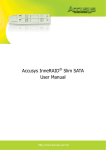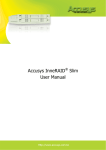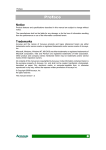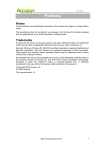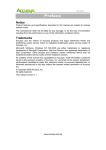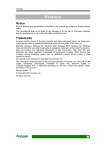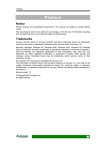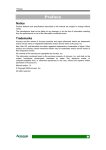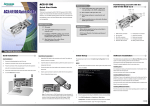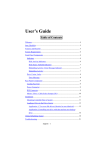Download Accusys ACS-75170 User`s manual
Transcript
StorConn GUI User’s Manual User’s Manual Notice Product features and specifications described in this manual are subject to change without notice. The manufacturer shall not be liable for any damage, or for the loss of information resulting from the performance or use of the information contained herein. Trademarks Accusys and the names of Accusys products and logos referenced herein are trademarks and/or service marks or registered trademarks and/or service marks of Accusys, Inc. Microsoft, Windows, Windows NT, MS-DOS are either trademarks or registered trademarks of Microsoft Corporation. Intel and Pentium are registered trademarks of Intel Corporation. Other product and company names mentioned herein may be trademarks and/or service marks of their respective owners. All contents of this manual are copyrighted by Accusys, Inc. The information contained herein is the exclusive property of Accusys, Inc. and shall not be copied, transferred, photocopied, translated on paper, film, electronic media, or computer-readable form, or otherwise reproduced in any way, without the express written permission of Accusys Inc. Manual version is 1.2 © Copyright 2008 Accusys, Inc. All rights reserved. http://www.accusys.com.tw 1 User’s Manual About this manual Congratulations on your selection of the StorConn GUI (graphical user interface). StorConn supports web-based real time local or remote monitoring of a RAID. It is designed to be used in conjunction with Accusys DeskRAID/InneRAID linked to each host. This manual covers all the information in detail. Intended user This manual is designed and written for users installing and using StorConn. The intended user should have working knowledge of RAID planning and data storage. Organization of the manual Chapter 1: Introduction to StorConn provides details of key features, checklists of requirements and pre-installation assumptions. Chapter 2: Setting up StorConn in Windows guides users through the entire setup process. In addition to installation of the GUI, this chapter explains how to view the history log. Chapter 3: Setting up StorConn in Mac OS guides Mac users through the entire setup process. In addition to installation of the GUI, this chapter explains how to view the history log and configure email alert settings. Users of other operating systems should skip this chapter. Chapter 4: Setting up StorConn in Linux guides Linux users through the entire setup process. In addition to installation of the GUI, this chapter explains how to view the history log and configure email alert settings. Users of other operating systems should skip this chapter. Chapter 5: Trouble shooting lists all of event messages and the possible solution for trouble shooting during using StorConn. Appendix C: Contact Accusys lists contact details of Accusys business units around the world. Guide to conventions Important information that users should be aware of is indicated with the following icons: Caution This icon indicates the existence of a potential hazard that could result in personal injury, damage to your equipment or loss of data if the safety instruction is not observed Note This icon indicates useful tips on getting the most from your RAID controller. http://www.accusys.com.tw 2 User’s Manual NOTICE 1 TRADEMARKS ......................................................................................................................................................1 ABOUT THIS MANUAL...........................................................................................................................................2 GUIDE TO CONVENTIONS ......................................................................................................................................2 1. INTRODUCTION TO STORCONN ................................................................................................5 1.1. KEY FEATURES ..............................................................................................................................................5 GUI...................................................................................................................................................5 Multi-interface..................................................................................................................................5 Remote monitoring ...........................................................................................................................5 Event notification..............................................................................................................................5 1.2. OPERATING SYSTEMS SUPPORTED LIST ..........................................................................................................6 1.3. INSTALLATION PREREQUISITES ......................................................................................................................6 Hardware requirements ....................................................................................................................6 Software requirements ......................................................................................................................6 Assumptions......................................................................................................................................6 2. SETTING UP STORCONN IN WINDOWS ....................................................................................7 2.1. INSTALLATION FLOWCHART ...........................................................................................................................7 2.2. SOFTWARE INSTALLATION .............................................................................................................................8 2.3. CONFIGURE STORCONN ................................................................................................................................9 2.3.1. Menu options:.......................................................................................................................10 2.4. MONITORING RAID STATUS WITH STORCONN ............................................................................................13 2.4.1. REMOTELY MONITOR STORCONN .............................................................................................13 2.5. MANAGEMENT ............................................................................................................................................14 2.5.1. RAID CAPACITY EXPANSION AND LEVEL MIGRATION ..................................................................14 2.5.2. RAID CONFIGURATION ...........................................................................................................15 2.5.3. ENVIRONMENT INFO................................................................................................................16 2.6. UNINSTALL STORCONN ...............................................................................................................................17 3. SETTING UP STORCONN ON MAC ...........................................................................................18 3.1. INSTALLATION FLOWCHART .........................................................................................................................18 3.2. SOFTWARE INSTALLATION ...........................................................................................................................19 3.3. LAUNCHING STORCONN SERVER ................................................................................................................21 3.4. REMOTELY ACCESSING STORCONN .............................................................................................................22 4. SETTING UP STORCONN IN LINUX..........................................................................................24 4.1. INSTALLATION FLOWCHART .........................................................................................................................24 4.2. SOFTWARE INSTALLATION ...........................................................................................................................25 4.3. LAUNCHING STORCONN SERVER ................................................................................................................27 http://www.accusys.com.tw 3 User’s Manual 4.4. REMOTELY ACCESSING STORCONN .............................................................................................................28 5. TROUBLE SHOOTING..................................................................................................................30 6. CONTACT ACCUSYS.....................................................................................................................33 ACCUSYS, INC....................................................................................................................................................33 ACCUSYS U.S.A., INC. .......................................................................................................................................33 ACCUSYS CHINA, INC. .......................................................................................................................................33 ACCUSYS EU B.V..............................................................................................................................................34 ACCUSYS KOREA, INC. ......................................................................................................................................34 http://www.accusys.com.tw 4 User’s Manual 1. Introduction to StorConn This chapter introduces the features and capabilities of StorConn. You will find: 1.1. Key features: Details of key features 1.2. Operating systems supported list: A checklist of operating systems supported 1.3. Installation prerequisites: A checklist of pre-installation assumptions 1.1. Key features StorConn is designed to be used in conjunction with Accusys DeskRAID/InneRAID. Supports up to four RAID boxes per host z Graphical User Interface (GUI) z Fault tolerant z Multi-platform and Operating System support z Multi-interface support z Remote monitoring z Web-based environment z Event notification GUI The graphical user interface enables easy monitoring of the status of a RAID in an intuitive graphical format. Multi-interface StorConn support in-band (SATA) and out-band (RS-232) connection. Remote monitoring StorConn can be accessed from any web-enabled terminal. Event notification Email and popup-window event notification keeps the administrator informed of the status of the RAID box. http://www.accusys.com.tw 5 User’s Manual 1.2. Operating systems supported list z Windows 2000 z Windows XP z Windows 2003 z Windows Vista z Windows 2008 z Mac OSX z Linux Fedora/Red hat 1.3. Installation prerequisites StorConn is designed to be used in conjunction with Accusys DeskRAID/InneRAID (up to four RAID boxes per host). Users require the following: Hardware requirements z Accusys DeskRAID/InneRAID DeskRAID: ACS-77100, ACS-77101, ACS-77110, ACS-77111, ACS-78100 InneRAID: InneRAID Slim, InneRAID Duo, InneRAID Pro, ACS-75170, ACS-76130 z RS232 cable backup connection from RAID box to host computer (optional) z Monitor display resolution of 800 x 600 (recommended) Software requirements z StorConn GUI program (Download from Accusys website: http://www.accusys.com.tw) z Supported operating system z Java-enabled web browser Assumptions Before the RAID and StorConn can be used, you must: z Connect the RAID box to your computer. z Install StorConn on your host computer. z Initialize the array. z These steps are described in detail in the RAID box User’s Manual. http://www.accusys.com.tw 6 User’s Manual 2. Setting up StorConn in Windows This chapter details the installation, setup and configuration process for StorConn on a Windows XP/2000/2003/Vista/2008 operating system. The screens shown are taken from Windows XP. 2.1. Installation flowchart The set up process follows these steps: Install StorConn . z Install StorConn. Configure StorConn z Launch StorConn. z Configure mail alert settings. Remotely access StorConn z Install web server software on the host machine. z Obtain your IP address. (if you do not already have it) z Make StorConn to be the default website on the host machine. . http://www.accusys.com.tw 7 User’s Manual 2.2. Software Installation Install StorConn The StorConn program can be downloaded from http://www.accusys.com.tw. The below steps will guide you to install the program. 1. Double click the Setup.exe file to start to install StorConn. The Welcome dialog box will appear. 2. Click Next to continue with the setup. 3. Read the license agreement carefully. Select Agree if you accept the terms of the agreement to continue the setup. 4. The setup program will install StorConn to the default location as C:\Program Files\StorConn. To install to a different location, either type in the new path or click Change and select a new location. 5. Once you have confirmed the setup location, click Next to continue. 6. The setup program will add shortcut icons to the default folder as “StorConn”. If you do not want to use the default folder, you can either type a new name, or select an existing folder from the list. 7. Once you have confirmed the shortcut icon location, click Next to continue. Installation will commence. 8. You will be prompted to Click Finish to complete the setup. http://www.accusys.com.tw 8 User’s Manual 9. Two shortcut icons will be created on desktop after software installation. StorConn Server is to launch StorConn GUI program. Monitor Window is to open StorConn monitor window. 2.3. Configure StorConn 1. To launch StorConn Server, go to Start > Programs > StorConn> StorConnServer. 2. The Detect Option dialog box will appear prompting you to scan the RAID box. StorConn supports in-band and out-band connection. Select “No” for not detect COM port device if you want to use in-band connection. Note StorConn Server can obtain RAID system information through the SATA connection or through the RS232 (COM port) connection. The program always checks first for the SATA connection, then the RS232 connection. If both connections are present, COM port is used. 1. RAID detection will commence to obtain information from the RAID box via SATA or RS232. The Detect Process dialog box shows the progress of the system’s detection of RAID box. http://www.accusys.com.tw 9 User’s Manual 2. Once the scan is finished, The StorConn RAID Information dialog box appears. This identifies the properties of the RAID box detected and its current status. RAID information includes: Serial Number: the serial number of the RAID box. Product ID: the product ID of the RAID box. Type: the port that StorConn program uses to communicate with the RAID box. Port: specifying the port detected. Baud Rate: the number of times per second a signal in a communications channel changes, or makes a transition between states (for COM port only). After confirming the information, click OK to exit. 3. The StorConn server icon appears on the task bar at the bottom right of the desktop. You can single click right bottom for option menu. Menu options: Run at Windows startup Allows StorConn to execute automatically when Windows startup. (Default is unexecuted) Enable / disable warning message Allows StorConn Server to pop up warning message window when event occur (Default is disable) http://www.accusys.com.tw 10 User’s Manual Configure Setup Configure mail alert setting. The mail alert settings should be configured so that, in the event of a RAID failure, the RAID administrator will be notified at once. The mail alert settings allow this to be done via email, so the administrator can passively monitor RAID status from anywhere, without having to keep monitoring StorConn. The steps below will guide you to configure the mail alert settings: 1. Click Config.Setup. The System Configuration Setup dialog box will open. 2. Enter the following values: Mail Server: Enter the host name of the mail server in your network or its FQDN (e.g. accusys.com.tw). If no Mail Server information is added, the mail alert function will be disabled. IP Address: Enter the IP address of the mail server in your network or its FQDN (Entries in the top two fields should be identical) Administrator’s Emails: Enter email addresses for two administrators. Delay Time (Minute): If a RAID failure occurs, an alert email will be sent immediately to each of the email addresses entered in the above field. Alert emails will continue to be sent until the problem is resolved. The Email will notify events which are disk status (off line, fails, rebuilding, rebuild OK, have bad sector, SMART warning) and RAID fails. Also enclosure events, fan fail, temperature fail, battery abnormal (ACS-75170, ACS-75200, ACS-76130 and ACS-76200 only) and power abnormal (ACS-78100 only) Enter here the desired time lapse between successive emails (minimum = 1 minute) Web Server Port: You can input any figure between 1 and 65535 3. Click Save to save the new configuration. History log View the history log. All malfunctions and events triggering an alert email are recorded in the history log. Select the History Log menu can view the log of error message. http://www.accusys.com.tw 11 User’s Manual Open monitor window Monitor your RAID box with StorConn. Click this option to open the monitor window on local computer. The StorConn browser window displays the following information: 1. RAID box tab: Allow customer to select which RAID to monitor. 2. RAID box information: Lists model name, serial number and current RAID level. 3. Disk status: Allows you to monitor the status of each of the disk drives. 4. Disk information: Lists model name, capacity of each of the disk drives and disk remap number (this function will support RAID level 5 of all products, but now it only support ACS-76130 ). If the disk remap exceeds ten times, it will reveal with red. The controller can support disk remap is 15. 5. Re-build / initialize progress: Tracks the re-building or initialization process. 6. Fan Status: Display the status of fan. 7. Thermometer status: Display the status of system thermometer. 8. Message window: Provides RAID box number, date, time, message when event occur. 9. Read SMART data of disk: Allow customer to read SMART states of disk. (Click disk icon, SMART information of the disk will display on the screen) Open Web Server Allow you to monitor the status of your remotely RAID in real time. (Default is unexecuted) http://www.accusys.com.tw 12 User’s Manual 2.4. Monitoring RAID status with StorConn The StorConn browser allows you to remotely monitor the status of your RAID in real time. 2.4.1. Remotely monitor StorConn Open a browser on an Internet-connected computer. Enter the url http://ip:web server port where ip is the IP address determined in Installing StorConn above, web server port is the System Configuration Setup. Note Java Runtime Environment must be installed for StorConn to be successfully displayed on a browser and JRE version must be 5.0 or later. If JRE is not already installed, the application can be downloaded free from http://java.sun.com/downloads/ The StorConn browser window displays the following information: 1. RAID box tab: Allow customer to select which RAID to monitor. 2. RAID box information: Lists model name, serial number and current RAID level. 3. Disk status: Allows you to monitor the status of each of the disk drives. 4. Disk information: Lists model name and capacity of each of the disk drives. 5. Re-build / initialize progress: Tracks the re-building or initialization process. 6. Fan Status: Display the status of fan. http://www.accusys.com.tw 13 User’s Manual 7. Thermometer status: Display the status of system thermometer. 8. Message window: Provides RAID box number, date, time, message when event occur. 9. Read SMART data of disk: Allow customer to read SMART states of disk. (Click disk icon, SMART information of the disk will display on the screen) 2.5. Management The StorConn support RAID capacity expansion and level migration (76200 only) and allows you to do RAID configuration and display the environment info. (Only for ACS-78100) 2.5.1 RAID capacity expansion and level migration 1. Click Expand Setting form Monitor Windows and the Expansion dialog box pops out on the screen. 2. Adjust the following settings: Manual Setting: a. Allow you to select which available RAID level that you want to change. b. Click OK to process the RAID expansion. 3. Please follow the steps of Message to let Array expand effective Note Controller will scan the spare disk before start expanding to make sure the drive is healthy, if the spare disk has bad sector, it will be kicked off. http://www.accusys.com.tw 14 User’s Manual Caution During the expansion process, please don’t turn off the system or pull out disk. Note If set up the state of the disk into a Dynamic disk, the expand function only can be use in 2R0 to R5. 2.5.2 RAID Configuration 1. Click Configuration form Monitor Windows and the Enter Password dialog box pops out on the screen. 2. You will be prompted to enter the Password. The default password is 0000 (four zeros). Click Ok, the Configure Setting dialog box will appear. 3. Configure Setting include Quick Setup RAID and Change password. 2.5.2.1 Quick Setup RAID 1. Click Quick Setup RAID and the RAID level setting dialog box will appear. Current RAID level : RAID level at present Current controller no : RAID Box number Select stripe size : stripe size at present Supported RAID Level : Display which RAID level you can select. Click OK to process the Quick Setup RAID. http://www.accusys.com.tw 15 User’s Manual 2. Please shutdown host to let new RAID can be created. Two ways can be shutdown the host. 3. If you select “Yes”, the host will shut down automatically in 15 seconds. 4. Please operate according to the content of message to let array effective 5. If you select “No” to shutdown the host by manual. Please follow the steps of Message to let Array effective. 2.5.2.2 Change password 1. Click Change password and the Change PassWord dialog box pops out on the screen. 2. Key in New password, then click OK. (the password limit four word) 3. You will be prompted to Click Ok and restart GUI program to complete the change password. 2.5.3 Environment info: 1. Click Environment Info form Monitor Windows and the environment info of RAID will display on the screen. Environment info has included fan, temperature, and voltage states. The revealing value is blue under the normal condition, otherwise reveal is red http://www.accusys.com.tw 16 User’s Manual 2.6 Uninstall StorConn This section details the software un-installation process for StorConn on a Windows XP/2000/2003 operating system. The screens shown are taken from Windows XP. The steps below will guide you to uninstall StorConn Server in Windows: 1. Go to Start > Programs >StorConn> Uninstall StorConn 2. The uninstaller dialog box will appear, chick Next to continue. 3. You will be prompted to Click Finish to complete the un-installation and exit. http://www.accusys.com.tw 17 User’s Manual 3. Setting up StorConn on Mac This chapter details the software installation, setup and configuration process for StorConn on a Mac operating system. The screens shown are taken from Mac Pro. 3.1Installation flowchart The set up process follows these steps: z Install StorConn In a Mac OS X Server environment there is no need to first install a Web Server. You can begin installing StorConn right away. z The Installation procedure of StorConn in Mac OS X Server and workstation are the same. Configure StorConn alerts Launch StorConn z The administrator must enter an email address to which alert emails will be sent automatically in the event of malfunction. z The history log displays error messages. z Once these set-up steps are completed, you are ready to access StorConn. http://www.accusys.com.tw 18 User’s Manual Software installation Follow the steps below to install StorConn on a Mac OS X operating system. 1. Insert the GUI program CD-ROM that delivered with RAID box package. 2. Extract Mac_StorConn.pkg.zip from CD-ROM to Desktop or a directory prefer. 3. Click on Mac_StorConn.pkg to begin installation of the StorConn GUI program on Mac system. 4. Choose the drive that you want to install the program and Click on Continue to next step. http://www.accusys.com.tw 19 User’s Manual 5. Configuring mail alert settings. Before installing StorConn, you must set the mail alert values. In the event of a RAID malfunction, an alert email will be sent to the RAID administrator at a specified address. 6. Enter the following values: Mail Server: Enter the IP address of the mail server in your network Sender: Enter an email address to identify the source of the alert email Receiver: Enter up to three e-mail addresses to which an email will be sent. Please add semicolon between mail address. Notify time (minutes): Enter the interval time between successive alert email dispatches (minimum value: 1 / maximum value: 65536) COM Port 1~4: Mac users should keep the default setting. 7. After fill up the above information, click on Save to go to next step. 8. Click on Close to complete the installation. http://www.accusys.com.tw 20 User’s Manual Launching StorConn Server 1. Find and access into the /Application folder. 2. Find StartGUI and click on it to run the program. 3. As the StorConn launches, the program will automatically scan for RAID box connected. A response similar to that beside should appear. Once the scan is completed, details of the Accusys RAID subsystems found will be listed. You will be asked Accept?!!<y\n>. If all controllers have been located, type y. 4. You can check if the server activate by typing command ps http://www.accusys.com.tw 21 User’s Manual Remotely accessing StorConn Note Java Runtime Environment must be installed for StorConn to be successfully displayed on a browser and JRE version must be 5.0 or later. If JRE is not already installed, the application can be downloaded free from http://java.sun.com/downloads/ 1. Open a browser on an Internet-connected computer. Enter the URL http://ip:3128/ where the IP is the IP address of the host machine and the port number is fixed at 3128. The browser will automatically display the StorConn interface. Turn to Chapter 6 Monitoring with StorConn to learn about its capabilities. http://www.accusys.com.tw 22 User’s Manual 1. RAID box tab: Allow customer to select which RAID to monitor. 2. RAID box information: Lists model name, serial number and current RAID level. 3. Disk status: Allows you to monitor the status of each of the disk drives. 4. Disk information: Lists model name and capacity of each of the disk drives. 5. Re-build / initialize progress: Tracks the re-building or initialization process. 6. Fan Status: Display the status of fan. 7. Thermometer status: Display the status of system thermometer. 8. Message window: Provides RAID box number, date, time, message when event occur. http://www.accusys.com.tw 23 User’s Manual 4. Setting up StorConn in Linux This chapter details the software installation process for StorConn on a Linux operating system. The screens shown are taken from Fedora code 6. Installation flowchart The set up process follows these steps: Install StorConn z In a Linux environment there is no need to first install a Personal Web Server. You can begin installing StorConn right away. Configure StorConn alerts Launch StorConn z The administrator must enter an email address to which alert emails will be sent automatically in the event of malfunction. z The history log displays error messages. z Once these set-up steps are complete, you are ready to access StorConn. http://www.accusys.com.tw 24 User’s Manual Software Installation 1. Insert the GUI program CD-ROM. 2. ExtractStorConn_Linux-1.0-1.i38 6.rpm from CD-ROM to Desktop or a directory preferred. 3. Click on StorConn_Linux-1.0-1.i386.rpm to begin installation of the StorConn GUI program on Linux system. 4. Choose the drive that you want to install the program and Click on Continue to next step. 5. Configuring mail alert settings. Before installing StorConn, you must set the mail alert values. In the event of a RAID malfunction, an alert email will be sent to the RAID administrator at a specified address. http://www.accusys.com.tw 25 User’s Manual 6. Enter the following values: Mail Server: Enter the IP address of the mail server in your network Sender: Enter an email address to identify the source of the alert email Receiver: Enter up to three e-mail addresses to which an email will be sent. Please add semicolon between mail address. Notify time (minutes): Enter the interval time between successive alert email dispatches (minimum value: 1 / maximum value: 65536) COM Port 1~4: Mac users should keep the default setting. 7. After fill up the above information, click on Save to go to next step. 8. Click on Close to complete the installation. http://www.accusys.com.tw 26 User’s Manual 4.3 Launching StorConn Server 1. Find and access into the /Application/Accessories/terminal . Open a terminal console. 2. Text in StartGUI on command line of terminal to launch the StorConn program. 3. As the StorConn launches, the program will automatically scan for RAID subsystems. A response similar to that beside should appear. Once the scan is completed, details of the Accusys RAID subsystems found will be listed. You will be asked Accept?!!<y\n>. If all controllers have been located, type y. http://www.accusys.com.tw 27 User’s Manual 4.4 Remotely accessing StorConn Note Java Runtime Environment must be installed for StorConn to be successfully displayed on a browser and JRE version must be 5.0 or later. If JRE is not already installed, the application can be downloaded free from http://java.sun.com/downloads/ 1. Open a browser on an Internet-connected computer. Enter the URL http://ip:3128/ where the IP is the IP address of the host machine and the port number is fixed at 3128. The browser will automatically display the StorConn interface. Turn to Chapter 6 Monitoring with StorConn to learn about its capabilities. http://www.accusys.com.tw 28 User’s Manual 1. RAID box tab: Allow customer to select which RAID to monitor. 2. RAID box information: Lists model name, serial number and current RAID level. 3. Disk status: Allows you to monitor the status of each of the disk drives. Open a browser on an Internet-connected computer. Enter the url http://ip/ where ip is the IP address of the host machine. 4. Disk information: Lists model name and capacity of each of the disk drives. 5. Re-build / initialize progress: Tracks the re-building or initialization process. 6. Fan Status: Display the status of fan. 7. Thermometer status: Display the status of system thermometer. 8. Message window: Provides RAID box number, date, time, message when event occur. http://www.accusys.com.tw 29 User’s Manual 5. Trouble shooting This chapter details the event messages and the possible solution for trouble shooting during using StorConn. The StorConn displays following error screens. Please find follow information for trouble shooting or connect Accusys Internet Support Center as http://support.accusys.com.tw. RAID Fail If one disk drive in a RAID 0 array fails, or two disk drives in a RAID 5 or RAID 1 array, all data on the array is lost and cannot be recovered. What to do if there is a RAID Fail A RAID failure results in all data on the array being lost. Please refer to your RAID box user manual to create a new RAID, or call your vendor. http://www.accusys.com.tw 30 User’s Manual Controller Fail If a COM Port fails, StorConn displays one of the following screens: 1. No Controller Connected: RAID box is not connected to the host What to do if there is this message? A. Please check your COM port and RS232 cable. 2. Network Connect Fail: Server & applet network connection doesn’t work, or server was terminated. What to do if there is this message? A. Restart the StorConn software program. http://www.accusys.com.tw 31 User’s Manual 3. Controller Fail: Controller shutdown or connection error. What to do if there is this message? A. Re-boot RAID box and re-start the StorConn server. Other Messages Event Message Description Action for solve Fan is abnormal! FAN Abnormal Call your vendor. Battery is abnormal Battery Abnormal Call your vendor. Disk <No> failed! Disk Fail Replace the file disk. Disk <No> is rebuilding! Disk Rebuild Start Just notice that the disk is start to rebuilding. Disk <No> rebuild OK! Disk Rebuild Completed Just notice that the disk is rebuild done. Disk <No> has Bad Sector Disk has bad sector Just notice that the disk has bad sector, Notification! Disk <No> SMART Warning! you can replace the disk. Disk SMART warning Just notice that the disk has SMART warning, you can replace the disk. http://www.accusys.com.tw 32 User’s Manual 6. Contact Accusys Accusys, Inc. • 5F, No. 38, Taiyuan St , Jhubei City, Hsinchu County 30265, Taiwan R.O.C. • Tel : +886-3-560-0288 • Fax : +886-3-560-0299 • Website: www.accusys.com.tw • Sales : [email protected] • Support: [email protected] Accusys U.S.A., Inc. • 46710 Fremont Blvd. Fremont, CA 94538, U.S.A. • Tel:+1-510-661-0800 • Fax:+1-510-661-9800 • Toll-free number:+1-866-277-5888 • Website: www.accusysusa.com • Sales : [email protected] • Support: [email protected] Accusys China, Inc. • 1701, Blk B, Horizon International Tower, No. 6 Zhichun Street, Haidian District, Beijing, postcode 100088, China. • Tel : +86-10-82800080 /81 /82 /83 • Fax : +86-10-82800784 • Website: www.accusys.com.cn • Sales: [email protected] • Support: [email protected] http://www.accusys.com.tw 33 User’s Manual Accusys EU B.V • Columbusstraat 22-26, Distripark Eemhaven, 3165 AD Rotterdam, Netherlands • Tel : +31-10-4284117 • Fax : +31-10-4284114 • Website: www.accusyseu.com • Sales : [email protected] • Support: [email protected] Accusys Korea, Inc. • Baegang B/D 5F Shinsa-Dong 666-14 Kanggnam-Gu, Seoul, Korea • Tel : (02)6245-9050 • Fax : (02)3443-9050 • Website: www.accusys.co.kr • Email : [email protected] http://www.accusys.com.tw 34



































